Hot Water in China
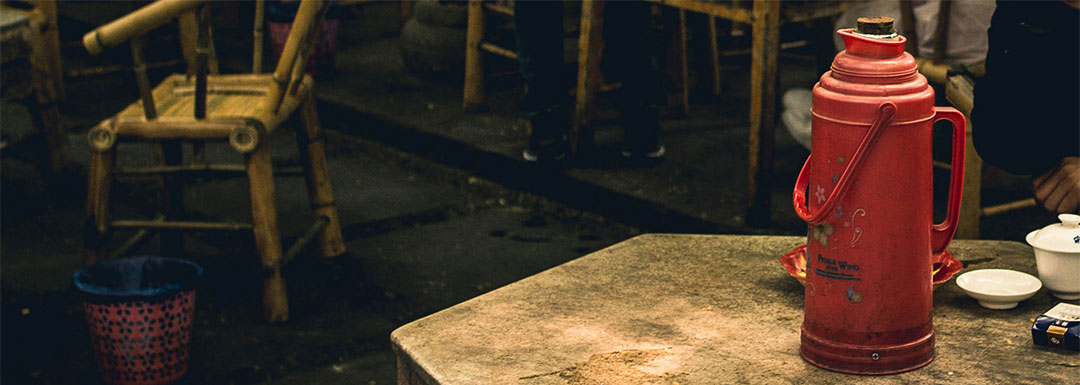
The first time I was offered hot water to drink
During the first week of my very first trip to China, I went to an office for a meeting. I was politely greeted at the door and shown the waiting area. Despite the fact I was in the south and it was summer-like weather outside, I was promptly given a cup of hot water. It seemed somewhat odd at first, but I figured since this was China, the hot water was for making tea and a selection of tea bags would soon follow. After several minutes and no tea bags in sight, I asked the receptionist if someone was going to bring some tea bags for the hot water. The conversation went something like this:
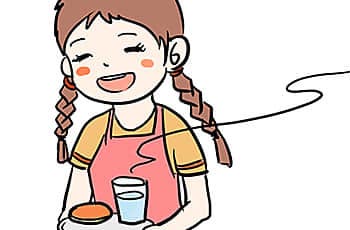
Me : “Uh, Hi. Hmmm, is someone going to bring any tea bags for the water?”
Receptionist : “Oh, you want tea?”
Me : “Well, it’s not that I really WANT tea, it’s just that I thought the cup of hot water was for tea.”
Receptionist : “I can check if we have some tea bags, if you like.”
Me : “Thanks, but that’s not really necessary.” Very puzzled now, “Sooo, what is the hot water for, if it’s not for making tea?”
Receptionist : “The hot water is for drinking.”
Me : “Just like that? Plain? No tea?”
Receptionist : “Yes. Just like that.”
Me : “No sugar? No tea? Just..plain..hot .. water? Really?”
Receptionist : “Yes. That’s correct. Please, have some. It’s good for you.”
This was my introduction to the age-old Chinese customs of 1) drinking plain, hot water year-round, 2) believing hot beverages are healthy, and 3) shunning cold beverages even in summer.
While some of the younger generation drink cold drinks and many westernrestaurants serve cold beverages (even with ice if you ask), the vast majority of people in China are completely faithful to their warm, liquid companions.
Plain, Hot Water
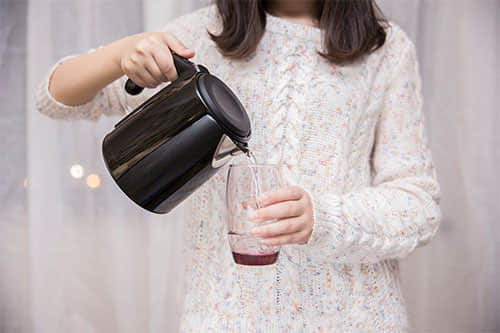
Drinking plain hot water is very common in China
The idea of drinking plain hot water is exceptionally foreign in non-Asian countries. Many Muslim nations will drink hot tea at high noon in the dead of summer, but it’s nearly impossible to find anyone enjoying a plain cup of steaming hot water anywhere outside of Asia. The custom is not unique only to China – their northeast Asian neighbors of Korea and Japan are quite fond of the refreshment too.
Visitors should be prepared, and not surprised, that when they visit an office, store, or someone’s home, they well may be offered a plain cup of hot water … and no tea, sugar, or other additive to accompany it. It would be considered rude to not accept it, but if you can’t stomach the thought of drinking plain, hot water, you can just hold the cup until it cools down or until you leave, take a small sip, and then leave the cup on the table or another appropriate place.
Hot Beverages are healthy and Cold Beverages are bad for you
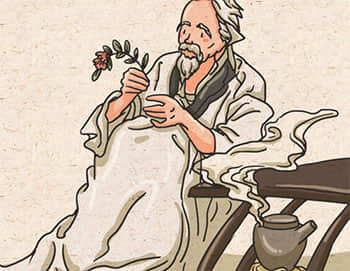
Hot beverages are good for health in traditional medicinal system
To understand where this deep love of hot water comes from, there are three main reasons.
Chinese Traditional Medicine+ 2,000 years
It should come as no surprise to readers that Traditional Chinese Medicine is still very much a large part of Chinese life and society. From this traditional medicinal system comes the belief that hot beverages are good for blood circulation and digestion, and cold beverages are not. This belief dates back around 2,000 years and has thus been engrained into Chinese culture.
Hot Water Super Powers
Hot water got a big boost in 1862. For several years prior, people rushed to Shanghai and the city’s population grew uncontrollably. Due to overcrowding and poor sanitation, a cholera epidemic broke out killing thousands in Shanghai and across much of the North. Curiously, the South didn’t suffer any deaths from this outbreak and in the 1860’s, the South was known to drink much more hot water than the North. Ta-Da! Word quickly spread around the country that the South was saved due to its extra consumption of hot water. This rumor, combined with traditional Chinese medicine touting its benefits, made the drinking of hot water to be a cure-all for the next 100-150 years. Still today, much of the older generation strongly believe that hot water can cure almost any ailment … and cold water will make you sick or worsen current symptoms.
Sanitation + Common Sense + Governmental Recommendations = Mega-Popularity
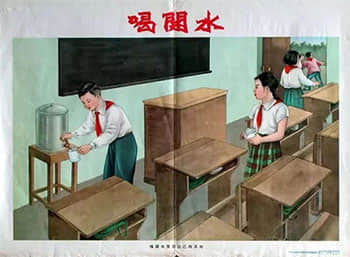
Patriotic Health Campaign:"Drink Hot Water" Poster, in 1954
Some 70 years after the Shanghai cholera outbreak, the government of the Kuomintang published “The Catalogue of the Requirements for the New Life Movement” for their “New Life Movement” campaign. In it, they extolled the value and importance of drinking hot water, along with 95 other rules of conduct. Several years later, after the Kuomintang was replaced by the Chinese Communist party, Mao Zedong and other top leaders actively encouraged the consumption of hot water amongst soldiers and then later, continued to encourage it among the general population – exactly as the Kuomintang had done. The reason both (completely opposing) governments endorsed the same liquid consumption activity when they couldn’t agree on much else came down to simple practicality –water sanitation was not good enough in most parts of the country to guarantee safe drinking water quality (this was especially true in rural areas). Boiled water, however, is safe to drink. So, in order to significantlydecrease the number of people running to the hospital with stomach disorders due to poor drinking water, and without the means in the middle 20th century to ensure safe drinking water in 100% of the country, both governments passed the responsibility of sanitation to the people, which wasn’t a difficult task due to the previous two reasons stated above.
What’s in all those thermoses?
Take a bus or a taxi, go into any office, or just walk down the street in any Chinese city and if you pay attention, you’ll see small thermoses everywhere: the bus driver likely has one, the person seated next to you on the subway, the person walking in front of you on the street, over half of the desks in an office. It’s not iced lattes, iced tea, or cold lemonade, and it’s not hot coffee either in those thermoses. Many of them contain hot tea (with the loose tea leaves included), but many more are just filled with hot water.
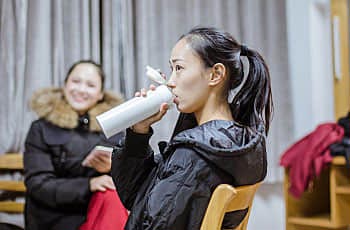
Drink hot water by using thermos
Tastes are Changing?
Today, hot water is still the hands-down favorite of the population. However, with the explosion of modern western restaurants and their icy cold drinks, international travel and study by an increasing number of Chinese, and Western entertainment highlightingcold drinks, the younger generation of Chinese is ‘warming up’ to the idea of drinking it cold.
The Real Deal
For anyone interested (and readers are welcome to do their own research), food and beverages naturally adjust to one’s body temperature as they are chewed, swallowed, and digested. So, everything we consume is quickly brought up, or down, to our own natural temperature.
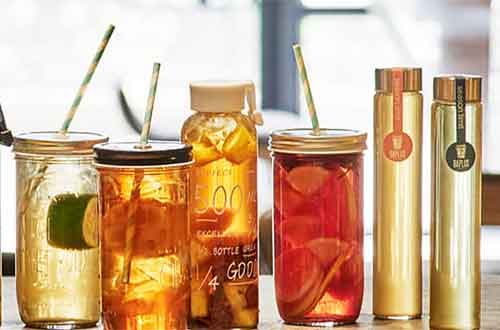 Chinese Beverages
Chinese Beverages 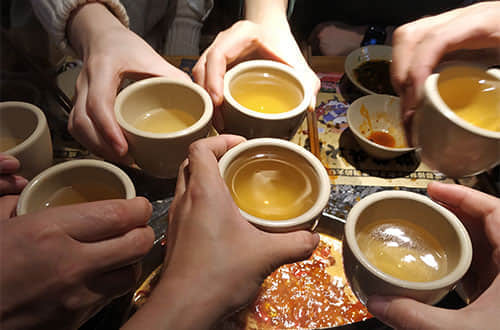 Ganbei (Bottoms up) - Chinese Drinking Culture
Ganbei (Bottoms up) - Chinese Drinking Culture 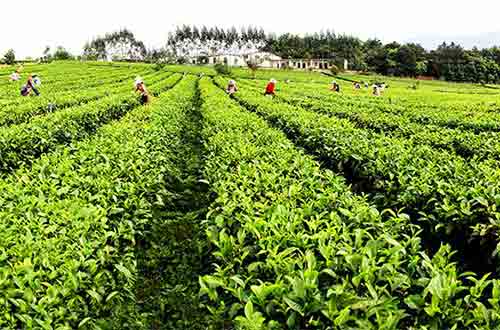 Chinese Tea
Chinese Tea 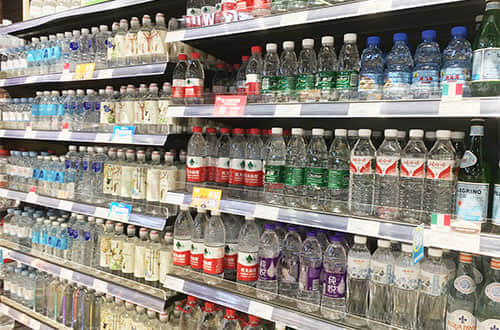 Drinking Water in China
Drinking Water in China